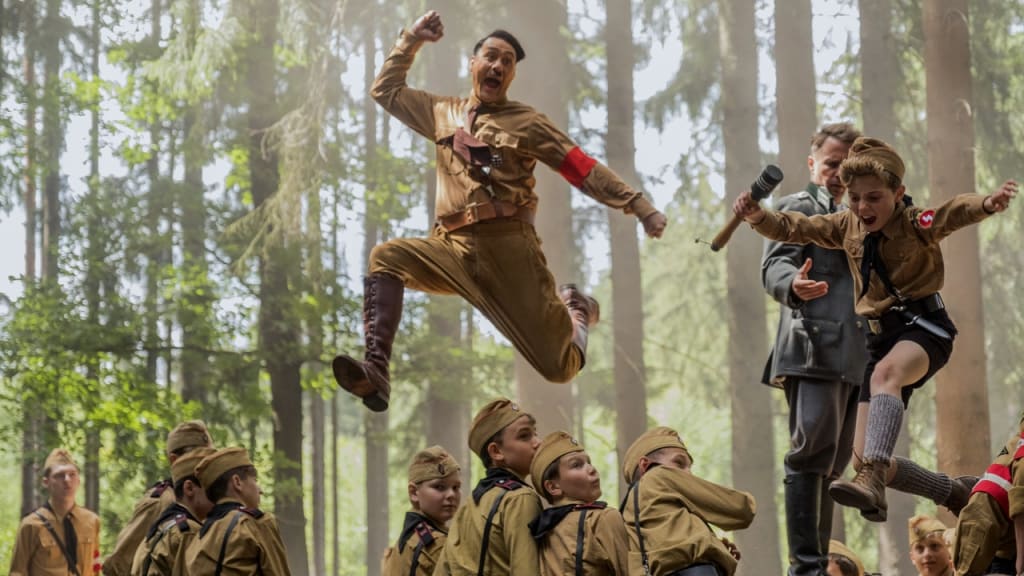How Jojo Rabbit Deconstructs the Absurdity of Fascism
"F**k off, Donald!"

Jojo Rabbit was my favorite film of 2019. There are many reasons: The existence of Scarlett Johansson, Taika Waititi’s take on Hitler, the arc of Sam Rockwell’s character, the complex and nuanced performance of Thomasin McKenzie. But above all, what I found most remarkable was the way in which Jojo Rabbit played with tone, layering and harmonizing different thematic modes in order to paint the world of 1940s Germany as something that we can connect to and learn from. As someone who specializes in tragicomedy, I found the film to be a unique blend of satiric farce and profound moments of tenderness and tragedy, all to paint a picture of the world inhabited by Germans during the Second World War, which was baptized in the personality cult of Adolf Hitler. We can see inside the mind of Jojo as he pictures a mythicized Hitler as his imaginary friend, a goofball who eats unicorns for dinner and charges through the woods alongside Jojo, into the arms of further humiliation. This personal, childish relationship our protagonist has with his fascist-god rings eerily familiar, doesn’t it? Maybe it sounds like your relative, or your coworker, or some guy you pass on the street. But Hitler is dead, and in his place sits Donald J. Trump, a soon-to-be former President of the United States.
The Trump years have been a farce, haven’t they? It seems as though there’s been a new screw-up every day, the absurdity of it bolstered by the fact that the enactor of the mistake holds the highest office in all the country. You wake up one morning. “Oh, the President said ‘covfefe’.” “Haha, look at that. He served McDonald’s in the White House. Haha. Hamberders.” “Does he understand how showerheads and toilets work?” “Pffft! He can’t even walk down a ramp! Look at how he drinks water!” “And now Rudy Giuliani’s melting, and Mike Pence has a fly on his head!” It’s like the SNL skits write themselves! But do you know what else the Trump years have brought about? Child concentration camps. The rollback of environmental protections. An entire reactionary culture of police worship that only arose when minorities started asking police, “Don’t kill us, please,” followed by months of unrest, the teargassing of unarmed and nonviolent protesters by grotesquely militarized riot cops, and a POTUS calling for the mass arrests and deaths of those protesters, many of whom are my close friends. A pandemic that large swaths of our population claimed for months was a hoax, leading to a Pearl Harbor’s worth of American deaths every day. It’s all wrapped up in this perfect little farce. We get so distracted by “covfefe” and “hamberders” that we forget about “concentration camps” and “constant unabashed high treason.”
That’s what we get to examine during the runtime of Jojo Rabbit. Obviously, it markets itself as a comedy. We get to laugh at inept Nazis and at Hitler being a goofball and at little Jojo falling in love and bragging about it with his equally innocent pal Yorki. But the marks of the trauma of wartime Germany are always evident throughout the script, perhaps reading as discordant to some viewers, but in the end mimicking the trauma of the contemporary American experience quite well. Klenzendorf shows off, in his first scene, the disturbing wound that removes him from the front lines of the war. Jojo’s mother Rosie is always struggling to feed both Jojo and Elsa, and she fights throughout the film to keep her own son from falling into the Nazi cult of personality. And as Jojo gets to know Elsa, he learns to feel and sympathize with her trauma of losing everyone she’s ever loved and cared about to the barbaric ethnic cleansing campaigns of the Nazis. In the end, we see every gag in the movie—the German shepherds, the children in paper uniforms, and even Klenzendorf in a flamboyant costume blasting demoralizing music over a portable gramophone—line up for battle in support of a Fuhrer and ideology that we know is in its death throes. We watch many of them die onscreen, very much traumatizing young Jojo, who is realizing, and this, too, is very familiar.
The terrorists—make no mistake, they’re certainly terrorists—who attacked the Capitol on the sixth of January were a colorful bunch of malevolent misfits. The photos show a carnival of camo, Confederate flags, red hats, Nazi imagery, and that good ol’ American flag draped around shoulders and printed on shirts. Hell, there was even a guy in a buffalo skin who called himself a damn shaman. It’s very easy to laugh at them: they’re all absolute jokes of people. But they were also dangerous and violent insurrectionists who intended to kidnap and even murder American leaders and their staff. They murdered a D.C. cop, which is ironic, because this is the same crowd that, in response to the Black Lives Matter movement months prior, chanted slogans like “Blue Lives Matter,” “Back the Blue,” and “All Lives Matter. Evidently that was bullshit. The same crowd that chanted “Build the Wall” and “Walls Work” wound up scaling the walls outside the Capitol. The truth of the matter is, this is a horrific event constructed from a farce, and all those absurd people who buy into those absurd conspiracy theories, in the end, if they fall down the rabbit hole as far as it will take them, will become dangerous and hurt themselves and those close to them.
So, what’s the solution here? Jojo Rabbit offers us four distinct story arcs of resistance against such a culture. Elsa, who is Jewish, resists the wave of fascism just by staying alive. Rosie wields consistent respect for humanity against the Nazi regime, and tries her best to instill values in those around her that undermine the very Nazi ideology: she fights hate with love. Klenzendorf does something similar. He’s a Nazi officer, but he dotes on Jojo like a father figure, and is still very much an affectionate person despite being a Nazi. He saves Jojo and Elsa’s lives twice: once by lying to the Gestapo, and once more by tricking the American soldiers into sparing Jojo, at the presumable expense of his own life. This indicates that Klenzendorf is one of many a larger collective of people who don’t necessarily buy into the hateful ideology that Hitler and the Nazi Party peddled, and is instead someone who fell into those ranks to survive, but still has the urge to resist the system that makes people suffer. Finally, there’s Jojo, who only realizes that the ideology he’s been dogmatized into is wrong following the deaths of his mother and Klenzendorf, and the experience of loving and keeping safe a member of the very community he’s been taught to dehumanize and despise. All of this doubt climaxes in one final moment when he says to his imaginary friend, “Fuck off, Hitler,” and kicks him right out the window. As someone who has lost close acquaintances to the MAGA cult, I genuinely hope that after experiencing the trauma of seeing American democracy defecated upon, and witnessing members of their party—the wannabe soldiers and the faux shamans—get arrested in droves, these individuals have their moment when they look their imaginary friend in the eye, say, “Fuck off, Donald,” and kick him down the ramp. It will be, just as it was in the film, both immensely dramatic and totally hilarious.
About the Creator
Steven Christopher McKnight
Disillusioned twenty-something, future ghost of a drowned hobo, cryptid prowling abandoned operahouses, theatre scholar, prosewright, playwright, aiming to never work again.
Venmo me @MickTheKnight






Comments
There are no comments for this story
Be the first to respond and start the conversation.